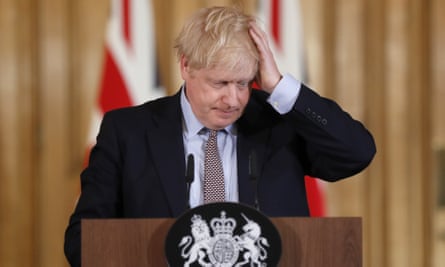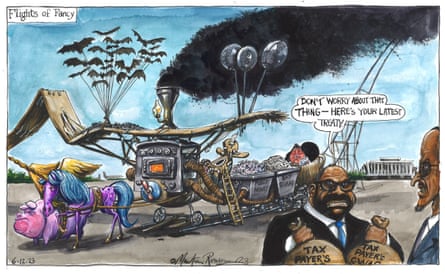Education
Wednesday briefing: Inside the Home Office’s new Rwanda plan – and why it might not work | World news
[ad_1]
Good morning. Whoever it was that bequeathed the Conservative government its current dog’s dinner of a policy on immigration and asylum, be in no doubt: the people in charge now are going to do things differently! After setting out draconian new limits on legal migration on Monday, home secretary James Cleverly yesterday turned to irregular migration and the small boats crisis.
In Kigali, he signed a new treaty with the Rwandan government that is supposed to help overcome the supreme court’s recent decision that the existing Rwanda deportation plans are unlawful. Next, the government will proceed with the second part of its plan to fix the Rwanda scheme: legislation that could prevent new court challenges. As he finalises plans that could be published tomorrow, Rishi Sunak must decide whether he wants to infuriate his party’s moderate MPs or those rallying around Suella Braverman on the right.
As far as the Downing Street grid goes, it’s definitely immigration week, again. But whether any of this will have an impact before the next election is another question. Today’s newsletter, with University of Bristol law professor and migration expert Dr Devyani Prabhat, is about what’s on the table to fix the Rwanda policy, and why it might not work. Here are the headlines.
Five big stories
-
Israel-Hamas war | The UN’s top aid official has said the Israeli military campaign in southern Gaza has been just as devastating as in the north, creating “apocalyptic” conditions and ending any possibility of meaningful humanitarian operations. Meanwhile, the UN heard accounts of sexual violence during the 7 October attacks by Hamas in a meeting where speakers accused women’s rights activists and UN officials of not doing enough to address the crimes.
-
Climate | Many of the gravest threats to humanity are drawing closer, as carbon pollution heats the planet to ever more dangerous levels, scientists have warned. Five important natural thresholds already risk being crossed, according to the Global Tipping Points report, and three more may be reached in the 2030s if the world heats 1.5C above pre-industrial temperatures.
-
Nuclear leaks | Sellafield, Europe’s most hazardous nuclear site, has a worsening leak from a huge silo of radioactive waste that could pose a risk to the public, the Guardian revealed. Concerns over safety at the crumbling building have caused diplomatic tensions with countries including the US, Norway and Ireland.
-
Covid inquiry | The mystery of Boris Johnson’s Covid-era WhatsApp messages has taken another twist before the former prime minister begins his evidence to the inquiry today, after it was reported that nearly six months of messages could not be retrieved. A spokesperson for Johnson blamed a “technical issue”.
-
NHS | Thousands of junior doctors are to stage new strike action in England after failing to reach a deal with the government in talks over pay. They will walk out for 72 hours from 7am on 20 December, and again for six days from 3 January.
In depth: The proposed treaty ‘will have a more elevated status in international law’ – but what does it really say?

The Rwanda scheme was first announced 20 months, four home secretaries and two prime ministers ago. While the government claims that it would prove a powerful disincentive if enacted, it has never appeared to be a realistic panacea for the problem of small boat crossings: Rwanda’s new facility has initial capacity for 200 migrants, while almost 30,000 people have made the journey across the Channel this year. Nonetheless, it has now become a cornerstone of the government’s messaging on dealing with the problem, and there is no prospect of a retreat before the next election.
In June, the supreme court declared the policy unlawful, concluding that there was a real risk that anyone sent to Rwanda could be returned to persecution in their home countries – known as refoulement. Cleverly’s trip to Rwanda, and the legislation expected to follow, are supposed to get past that, and make the proposals into a reality. But there are good reasons to be sceptical about their prospects of success.
What does the new Rwanda treaty say?
In Rwanda, Cleverly (above) signed a revised treaty between the two countries. As well as including a pledge from Rwanda that even those whose asylum claims fail will not be sent anywhere but the UK, it sets out new safeguards that are meant to ensure it keeps its word. The Home Office says there will be “enhanced” functions for an independent monitoring committee. There will also be a new appeals body, made up of judges with experience of asylum law.
The proposed treaty “looks like lots of creative legal architecture to meet the non-refoulement duty,” Devyani Prabhat said. “Each aspect will be challenged in court.” Still, the new plan “will have a more elevated status in international law”, because it is a formal treaty rather than a “memorandum of understanding”. The question is whether the announced safeguards would be enough to change the supreme court’s mind.
“The supreme court has relied on reports of external agencies, including the UN Refugee Agency, on the situation in Rwanda, so a treaty on its own cannot change the situation,” Prabhat said. (The UNHCR pointed to at least 100 allegations of threatened and actual refoulement in its evidence to the court; you can read the judgment here.) But, she added, “if there is legislation to follow up on the same points in parliament, which is passed, it may be more difficult to challenge in court.”
What will the legislation say?
We don’t know yet – but here are the key points reported to be under consideration.
Will the UK opt out of the European Convention on Human Rights? This is the most radical option that has been discussed, preferred on the right of the Conservative party and said to have the support of immigration minister Robert Jenrick. The UK has been a signatory to the ECHR since it was set up in 1959; it is therefore bound by its judgments, like 45 other members of the Council of Europe.
This is not a question of the UK formally leaving the ECHR, which would be a “lengthy process requiring parliamentary approval and six months’ notice”, Prabhat said. “Otherwise, it’s illegal.” But the government could choose to ignore its jurisdiction over the Rwanda scheme, an approach mooted in Suella Braverman’s letter to Rishi Sunak after she was fired. That would involve a clause saying that “notwithstanding” the court’s view – legal claims could still be filed at the Strasbourg court – the UK would do what it wants anyway.
That would also be unlawful, Prabhat said, and up to ten ministers would reportedly consider resigning if Sunak chooses this option. The Times reported (£) that government lawyers have refused to approve such an approach because they fear it would leave them in breach of the civil service code. Reports today suggest that Tory moderates have received assurances that Sunak will not take that approach.
Will the government “disapply” the UK’s Human Rights Act? The option reported as Sunak’s most likely choice. There is a limit to what this legislation means for the Rwanda scheme, Sir Jonathan Jones KC notes for the Institute for Government: the Human Rights Act does not allow courts to strike down primary legislation, but simply declares it incompatible with the act and leaves it to the government to respond.
In any case, rightwing Conservatives have also demanded legislation excluding the Rwanda scheme from the protections offered by the act. It is suggested that this could be enough to change the supreme court’s mind, because it is the Human Rights Act which applies the ECHR’s provisions within the UK.
But simply declaring the act irrelevant is “not possible unless it is repealed”, Prabhat said. “Even then, basic human rights are part of common law and international law jurisprudence.” Individual asylum seekers could continue to use the Human Rights Act to challenge their removal to Rwanda, meaning that legal hurdles would still remain.
Will the legislation simply declare Rwanda a safe country? In a sense the most straightforward option, this is nonetheless unconventional: laws are not typically passed to assert the government’s opinion as fact. “A mere declaration in parliament will not be enough,” said Prabhat. “But it may be part of a more comprehensive statute.” If there are specific assurances in the bill that align with the treaty signed by Cleverly yesterday, that might have more force.
Such a plan might work as a matter of UK law, Jones writes. “Ultimately, one would expect the (UK) courts to give effect to such primary legislation, if drafted sufficiently tightly and unambiguously. That would (probably) close off challenges in the domestic courts.”
But there is still a possibility that the evidence the supreme court heard about the risk of refoulement will hold sway. Much could depend on whether the new safeguards are deemed effective. “A monitoring system which draws in international safeguarding from impartial human rights agencies might be considered some safeguard,” Prabhat said. But a suggestion that British lawyers could be stationed in Rwanda to monitor the system there “does not seem practicable. Would asylum-knowledgable lawyers actually move their practice to Rwanda? Who would fund it?”
Will any of this work?
It depends on what you mean by work. Even if the government alights on a set of proposals that can command the support of MPs, there is still the strong possibility that it will be defeated in the House of Lords – and there is not enough time left before the next election to force the legislation through. There would inevitably be further legal challenges, and it seems unlikely that the effectiveness of this legislation will be clear before they are exhausted – again, unlikely before the next election. If the aim is to create a powerful disincentive for those crossing the Channel in small boats, that all seems to amount to a failing grade.
On the other hand, many of the government’s critics suspect that the aim is not to “succeed”, but to create a wedge issue for the next Conservative manifesto by being thwarted by the court again. The wisdom of an approach which rests on highlighting the government’s repeated failure to enact an effective policy might be questionable, but if that’s the idea – a contention denied by the government – then yes, it could work.
“Blaming outsiders (especially if they are presented as sub-human and not deserving) is … always popular,” Prabhat said. “Especially before elections.” But the premise of the solution being proffered, that the UK is a soft touch because of the law’s protection of human rights, is one she rejects. “The crisis is in the lives of those fleeing wars and persecution,” she said. “Not in our system.”
after newsletter promotion
What else we’ve been reading

-
“There’s no item of clothing more costly, to the environment or your bank balance, than the one you never wear.” I have recently started to rewear clothes that have languished in my wardrobe for years, so these small hacks like washing less and more tailoring to make our wardrobes more sustainable are music to my ears. Nazia Parveen, acting deputy newsletters editor
-
Yesterday’s long read, by Imogen West-Knights, is about what happened in the 72 hours after seven chimpanzees escaped from a Swedish zoo. It’s a very sad story, full of astonishing details, and brilliantly told. Archie
-
Sosa Henkoma was just eight when he ran away from violence at home – and 12 when he was given his first gun. He was trafficked by drug gangs as a child, shot at and stabbed 11 times. He describes how fatherhood, therapy and sheer luck saved him. Nazia
-
Anna Aslanyan, a translator, is full of professional sympathy for her colleague who was blamed for including the names of two royals accused of racism in a Dutch edition of Omid Scobie’s book. “Translation is like rubbish collection,” she writes. “People notice it only when something goes wrong.” Archie
-
It might sound like an inconsequential rise to some – but in National Geographic, scientists explain the serious consequences for life as we know it if the planet exceeds the climate target of 1.5C. Nazia
Sport

Football | A 6-0 win against Scotland wasn’t enough for England’s Lionesses to top their table in the Women’s Nations League, after fellow group members the Netherlands beat Belgium 4-0 to progress ahead of England. That means the Dutch are through to the Nations League semi-finals and, as a result of England’s exit, Team GB will not be in the Paris 2024 Olympics football competition.
Football | An injury time goal from Declan Rice was enough to secure Arsenal a 4-3 win in a thrilling match against relegation-threatened Luton. After the high of putting five goals past the Premier League’s bottom club a few days ago, Burnley faced a tougher test against Wolves, walking away with a 1-0 defeat.
Boxing | Featherweight boxing champion Amanda Serrano has relinquished her WBC title after the organisation refused to allow her to compete in bouts under the same rule-set as men’s boxing, with 12 three-minute rounds. Women’s championship fights are typically scheduled for no more than 10 rounds with each round lasting two minutes.
The front pages

The Guardian leads with “‘Apocalyptic’ conditions in Gaza blocking aid, warns UN official”. The i has the latest on the Covid inquiry, under the headline “Why did the bodies have to pile high?” The Financial Times says “Carmakers win three-year reprieve on electric tariffs between Britain and EU”.
The Times headlines “Sunak’s middle way on Rwanda”, on the prime minister’s attempts to revive the government’s plans to deport migrants to Rwanda. The Telegraph looks at the same story with “Minister’s threaten to quit over Rwanda flights law”.
The Mail reports on the announcement of fresh demonstrations by junior doctors with “The cruellest and most indefensible doctor’s strike yet”. The Mirror carries an investigation, with the headline “Christmas cosmetic surgery fear”.
Today in Focus

Boris Johnson v the Covid inquiry
After accusations of erratic decision-making during the pandemic, the former prime minister will finally face the inquiry. Aletha Adu reports
Cartoon of the day | Martin Rowson

The Upside
A bit of good news to remind you that the world’s not all bad

Pangolins are thought to be the world’s most trafficked mammals, especially to Asian markets, where the meat and scales are sold. For years, the nocturnal animal (above) was thought to be locally extinct, with the last sighting in western Kenya dating back to 1971. So when Fred Telekwa, a local farmer, found a giant pregnant ground pangolin that had been electrocuted by his fence, he was distraught. He is now part of the fight to keep this highly endangered species alive. Conservationists estimate that there are now between 30 and 80 left in the country.
The Pangolin Project has been working with landowners around the Nyakweri forest to create space for these animals, which is difficult for many farmers like Telekwa who have been clearing the forest for farming and putting up electric fences to dispel wild animals. In a bid to win hearts and minds, the group has been talking to local residents to raise awareness of the issue and directly helping landowners to remove the lowest strands of electric fences, which are the most dangerous threat to the animals. “I feel we are protecting the last of the pangolins. We will give all it takes for a protected habitat with a viable population,” says Beryl Makori, a project manager.
Sign up here for a weekly roundup of The Upside, sent to you every Sunday
Bored at work?
And finally, the Guardian’s puzzles are here to keep you entertained throughout the day – with plenty more on the Guardian’s Puzzles app for iOS and Android. Until tomorrow.
[ad_2]
Source link
Related posts:












